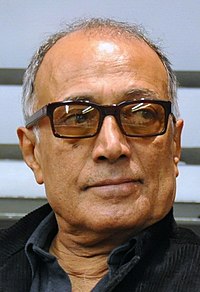Abbas Kiarostami
| Abbas Kiarostami | |
|---|---|

Kiarostami in Syracuse University New York, 2 April 2014.
|
|
| Native name | عباس کیارستمی |
| Born |
22 June 1940 Tehran, Iran |
| Died | 4 July 2016 (aged 76) Paris, France |
| Burial place | Tok Mazra'e Cemetery, Lavasan, Shemiranat, Iran |
| Nationality | Iranian |
| Alma mater | University of Tehran |
| Occupation | Film director, screenwriter, photographer, producer, painter, poet |
| Years active | 1962–2016 |
| Notable work | |
| Style | Documentary, minimalist |
| Home town | Gheytarieh, Tehran, Iran |
| Spouse(s) | Parvin Amir-Gholi (m. 1969–82) |
| Children |
|
| Parent(s) |
|
| Signature | |
 |
|
Abbas Kiarostami (Persian: عباس کیارستمی ![]() pronunciation ; 22 June 1940 – 4 July 2016) was an Iranian film director, screenwriter, photographer and film producer. An active film-maker from 1970, Kiarostami had been involved in over forty films, including shorts and documentaries. Kiarostami attained critical acclaim for directing the Koker trilogy (1987–94), Close-Up (1990), Taste of Cherry (1997) – which was awarded the Palme d'Or at the Cannes Film Festival that year – and The Wind Will Carry Us (1999). In his later works, Certified Copy (2010) and Like Someone in Love (2012), he filmed for the first time outside Iran: in Italy and Japan, respectively.
pronunciation ; 22 June 1940 – 4 July 2016) was an Iranian film director, screenwriter, photographer and film producer. An active film-maker from 1970, Kiarostami had been involved in over forty films, including shorts and documentaries. Kiarostami attained critical acclaim for directing the Koker trilogy (1987–94), Close-Up (1990), Taste of Cherry (1997) – which was awarded the Palme d'Or at the Cannes Film Festival that year – and The Wind Will Carry Us (1999). In his later works, Certified Copy (2010) and Like Someone in Love (2012), he filmed for the first time outside Iran: in Italy and Japan, respectively.
Kiarostami had worked extensively as a screenwriter, film editor, art director and producer and had designed credit titles and publicity material. He was also a poet, photographer, painter, illustrator, and graphic designer. He was part of a generation of filmmakers in the Iranian New Wave, a Persian cinema movement that started in the late 1960s and includes pioneering directors such as Masoud Kimiai, Sohrab Shahid Saless, Dariush Mehrjui, Bahram Beyzai, Nasser Taghvai and Parviz Kimiavi. These filmmakers share many common techniques including the use of poetic dialogue and allegorical storytelling dealing with political and philosophical issues.
...
Wikipedia
